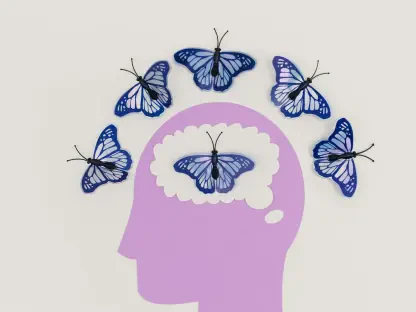The prevalence of anxiety disorders is a significant concern within modern society, with millions of individuals affected worldwide. Traditionally, medication has been the cornerstone of treatment strategies, aiding many in their pursuit of mental wellness. However, an increasing number of people are exploring non-pharmacological interventions, driven by a desire to avoid potential side effects or dependency associated with medication. The search for alternative approaches to anxiety management has gained momentum, fueled by the growing awareness and availability of options that promise relief without relying on pharmaceuticals. This consideration has led to a diverse array of therapeutic techniques aimed at managing anxiety naturally, thereby allowing individuals to regain control over their mental health with potential long-term benefits.
Non-Medication-Based Therapies
Psychotherapy stands as a prominent pillar in non-pharmacological anxiety management, with cognitive behavioral therapy (CBT) often singled out for its efficacy. CBT assists individuals by identifying and transforming negative thought patterns that contribute to anxiety, fostering improved emotional responses and behaviors. Through structured sessions, patients learn coping mechanisms and strategies to manage anxiety-provoking scenarios more effectively. Other forms of psychotherapy, such as dialectical behavioral therapy (DBT) and mindfulness-based stress reduction (MBSR), also offer avenues for anxiety alleviation. Each method presents distinct techniques, focusing on acceptance, mindfulness, and emotional regulation. Professional guidance is essential in choosing the most suitable therapeutic approach, ensuring the therapy aligns with the individual’s mental health needs. By engaging in regular sessions and maintaining open communication with therapists, patients can benefit from personalized care and enhanced treatment outcomes.
Lifestyle and Physical Activity
Lifestyle modifications, particularly exercise, offer substantial benefits for those grappling with anxiety. Regular physical activity has been shown to enhance mood and reduce stress levels, serving as a natural countermeasure to anxiety symptoms. Aerobic exercises like jogging, cycling, and swimming are notable for their effectiveness, yet high-intensity interval training (HIIT) is gaining attention for its rapid and robust impact on mental health. Despite promising results, research into exercise types and their specific benefits remains ongoing, underscoring the need for comprehensive studies to solidify existing findings. Alongside physical activity, dietary adjustments form a critical aspect of anxiety management. Caffeine reduction is recommended to mitigate heightened anxiety symptoms, supported by studies linking excess caffeine intake to increased anxiety prevalence. Alcohol moderation is similarly advised; anecdotal evidence suggests a correlation between decreased consumption and relief from anxiety symptoms. These lifestyle changes, when synergized, can offer tangible improvements in managing anxiety, though individual variations necessitate tailored approaches.
Community and Support Systems
A supportive community is vital for individuals managing anxiety, providing both emotional and practical assistance. Support groups, whether online or in-person, offer a sense of belonging and shared experiences among those navigating similar challenges. These groups enable individuals to exchange strategies, seek advice on healthcare options, and foster resilience through communal interactions. Participants often find comfort in the understanding environment created by peers, which can be instrumental in reducing feelings of isolation and helplessness. Beyond group settings, a supportive environment extends to personal and professional spheres, encompassing relationships with family, friends, and colleagues. Having a reliable network bolsters confidence and facilitates coping mechanisms, allowing individuals to confront anxiety with reinforced support. Through these networks, people can access resources like therapy recommendations, mental health forums, and educational materials tailored to their specific needs, ultimately enhancing their anxiety management journey.
Complementary and Alternative Treatments
Complementary therapies present intriguing possibilities for anxiety relief, advocating approaches such as massage, acupuncture, and chiropractic care. Studies offer varying levels of support for these methods, suggesting potential benefits for anxiety reduction. Massage therapy is lauded for its relaxation effects, while acupuncture may alleviate anxiety through energy channel manipulation. Chiropractic care is explored for its role in stress relief and physical alignment. Although evidence for their efficacy remains inconclusive, these treatments retain popularity within holistic wellness communities. Transcranial magnetic stimulation (TMS) emerges as a noteworthy alternative intervention, showing promise in addressing generalized anxiety and PTSD symptoms. TMS employs magnetic fields to stimulate nerve cells in the brain, potentially altering neural pathways linked to anxiety. Early research presents encouraging outcomes, yet continued investigation is required to substantiate its role within non-medication-based treatments, ensuring safe and effective application for broader audiences.
Stress Reduction Techniques
Applying structured stress-reduction techniques can profoundly impact anxiety management, offering practical tools for individuals seeking natural relief. Progressive muscle relaxation and deep breathing exercises emerge as foundational strategies, enabling individuals to diminish physiological symptoms of anxiety and reclaim mental calmness. These methods encourage focused relaxation and controlled breathing, leading to reduced stress and enhanced emotional regulation. Time spent in natural settings further complements stress alleviation, with exposure to greenery and fresh air fostering mental tranquility. Nature immersion supports mood improvement and stress reduction, providing a soothing escape from urban stressors. Engaging in self-care activities, such as reading, listening to music, or practicing digital detox, enriches mental health by reducing technology-driven stress and promoting relaxation. These strategies collectively contribute to a comprehensive framework for stress management within anxiety treatment plans, empowering individuals to cultivate sustainable wellness habits.
Holistic Mental Health Management
Achieving effective anxiety management often necessitates a holistic approach that integrates diverse strategies, encompassing lifestyle changes, psychological support, and self-help methodologies. A holistic perspective acknowledges the multifaceted nature of anxiety, addressing physical, emotional, and social dimensions to foster comprehensive care. Cooperation between therapists and patients in crafting personalized treatment plans amplifies success rates, as unique needs and circumstances dictate which interventions resonate most. Embarking on a diversified wellness journey encourages adaptability and responsiveness to individual progress, maximizing potential improvement in mental health. Emphasizing the importance of personalized approaches highlights how distinct aspects of care mesh to create a robust support network. Each component plays a pivotal role, contributing to dynamic and continuous development aimed at proficient anxiety management. By recognizing the interconnectedness of elements within holistic mental health care, individuals are empowered to pursue tailored solutions that align with their aspirations for an improved quality of life.
Personal Effort and Professional Guidance
Psychotherapy is a significant component in non-pharmacological approaches to anxiety management, with cognitive behavioral therapy (CBT) lauded for its effectiveness. CBT aids individuals by pinpointing and reshaping negative thought patterns that fuel anxiety, promoting better emotional responses and healthier behaviors. During structured sessions, patients acquire coping skills and strategies to navigate anxiety-inducing scenarios more proficiently. Alongside CBT, other therapies like dialectical behavioral therapy (DBT) and mindfulness-based stress reduction (MBSR) offer alternative pathways for anxiety relief. These therapies each present unique techniques centered around acceptance, mindfulness, and emotional regulation. Selecting the right therapy requires professional guidance to ensure alignment with the patient’s mental health needs. Regular sessions and open dialogue with therapists enhance personalized care and optimize treatment outcomes, offering a tailored approach to managing anxiety effectively.









